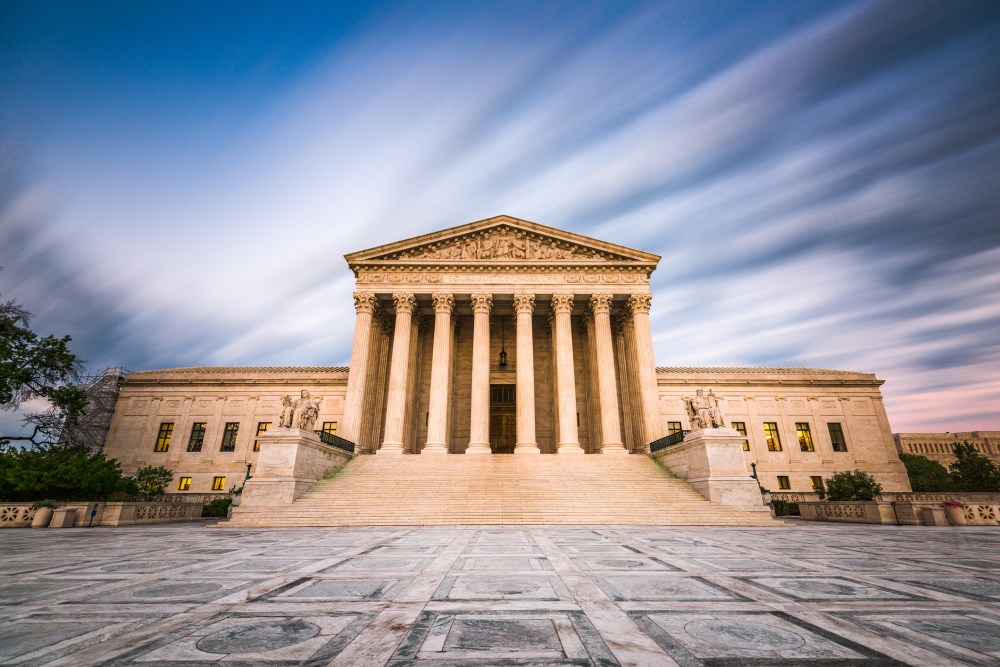
Traditionally, the U.S. Supreme Courtroom has been reluctant to weigh in on redistricting points, even holding in 2019 that federal courts can not evaluation partisan gerrymandering claims. However two current selections from SCOTUS’s infamous “shadow docket,” whereas technically a win for voting rights advocates, signaled that the Courtroom is likely to be gearing as much as make a giant resolution on the problem.
North Carolina
Earlier this yr, the North Carolina Supreme Courtroom invalidated a brand new congressional map drawn by the state legislature that will possible lead to Republicans selecting up two extra seats. On remand, the trial courtroom rejected a brand new map proposed by the Republicans and required the usage of a map made by court-appointed consultants.
With North Carolina’s primaries quick approaching, Republican legislators appealed to the U.S. Supreme Courtroom on February 25 for an emergency keep. In Moore v. Harper, the Courtroom denied the stick with no rationalization. However the dissent, comprised of conservative Justices, known as the problem “an exceptionally vital and recurring query of constitutional regulation, specifically, the extent of a state courtroom’s authority to reject guidelines adopted by a state legislature to be used in conducting federal elections.”
Learn the total Moore opinion and 1000’s extra with a free trial of Westlaw Edge.
Although Justice Kavanaugh agreed that the problem was more likely to maintain popping up, he didn’t assume that it was applicable to grant the keep as a result of the candidates had been in search of “extraordinary” interim aid.
Pennsylvania
The Pennsylvania case of Toth v. Chapman begins alongside the identical strains as Moore. After the 2020 census, the state’s Republican-led legislature redrew voting districts in a manner that eradicated considered one of Pennsylvania’s 18 Home seats, leaving 9 more likely to be crammed by Democrats and eight by Republicans.
Pennsylvania Governor Tom Wolf vetoed the map. In the meantime, a gaggle of voters filed go well with to ask the state courts to undertake an various map often called the “Carter Plan.” The proposed plan put two incumbent Republicans in the identical voting district and created one other possible Democratic seat along with these within the legislature’s plan.
State courts had been break up on the problem. A state trial decide really helpful the state use the legislature’s map, however a divided Pennsylvania Supreme Courtroom adopted the Carter Plan. Once more, SCOTUS denied the Pennsylvania Republicans’ request for an injunction with out rationalization. Nevertheless, the Courtroom famous that both celebration might “train their proper to enchantment” a future resolution by the district courtroom to which the case was remanded.
So, in each Moore and Toth, SCOTUS opted to not intervene. However a number of justices, together with Kavanaugh, have indicated that the Courtroom ought to quickly study the authorized idea on the heart of those instances—often called the “impartial state legislature doctrine.”
Will SCOTUS Minimize Out Assessment By State Courts?
Proponents of the impartial state legislature doctrine argue that Article I, Part 4, Clause 1 of the Structure provides authority over elections solely to state legislatures when it states:
“The Occasions, Locations and Method of holding Elections for Senators and Representatives, shall be prescribed in every State by the Legislature thereof; however the Congress could at any time by Regulation make or alter such Laws, besides as to the Locations of chusing [sic] Senators.”
Underneath this interpretation, state legislatures can redistrict nonetheless they “chus” with out evaluation by a state courtroom. Though the doctrine lacked its present moniker on the time, SCOTUS did contact on the overall thought in Bush v. Gore, the place Justice Rehnquist argued in a concurrence that recounts conflicted with deadlines set by the Florida legislature.
Based mostly on Justice Kavanaugh’s concurrence in Moore, SCOTUS may simply be ready for the best case to deal with the impartial state legislature doctrine. Current shadow docket selections turned on the “Purcell precept”— a doctrine primarily based on the holding in Purcell v. Gonzalez that courts shouldn’t change state election guidelines proper earlier than an election. The justice reasoned that “it’s too late for the federal courts to order that the district strains be modified for the 2022 main and normal elections, simply because it was too late for the federal courts to take action within the Alabama redistricting case final month.”
The Alabama case Kavanaugh refers to was Merrill v. Milligan, the place he additionally wrote that the timing wasn’t proper for a choice on the deserves. “[E]ven heroic efforts possible wouldn’t be sufficient to keep away from chaos and confusion,” he wrote in a concurrence joined by Justice Alito. If we glance again to Moore, challengers argued that the impartial state legislature doctrine wasn’t implicated in any respect as a result of the legislature had explicitly given state courts the facility to do what they did.
However, if a case comes up far sufficient forward of an election to get round Purcell, issues might get attention-grabbing.